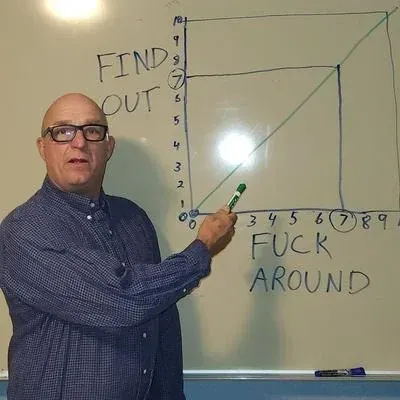I am miserable

"I WANT TO DIE." I've said this before so many times growing up. One time, I even ran away from home for like an hour, only to realize my life is nothing without my computer. Cringe.
But before you go, “what the fuck,” let me be clear: THIS IS A POSITIVE ARTICLE ABOUT PROBLEM SOLVING.
I’m mainly writing this article for myself to read when I’m down, but let’s be real – we all have these moments. So maybe, just maybe, you’ll find something in here that hits home for you too. Here’s hoping.
FEELING LIKE SHIT
Life throws punches at you, sometimes so hard that you’re convinced you’ll never get back up. The worst part is that when you’re in that dark place, it feels like you’re the only one going through it. It feels endless, like there’s no way out, and every effort to climb out feels like a waste of time. But here’s the truth: everyone hits rock bottom at some point.
FROM HELL AND BACK
Let me tell you about a friend of mine – I won’t name him, but he’s someone I deeply admire. He’s older, been through a divorce, remarried, and has a kid. I look up to him, especially as he’s inspired me to think about the kind of parent I want to be one day. Every time he sends me a picture of himself and his kid doing activities together, I’m reminded of what it means to be a great father.
But here’s the thing – this guy didn’t have it easy. He’s hit rock bottom twice. The first time, he found himself walking into a Gamblers Anonymous meeting, admitting he was $200,000 in debt. That kind of debt isn’t just a number; it’s a crushing weight that feels like it’s going to bury you alive. But he didn’t let it. He fought his way out, paid off his debts, and rebuilt his life.
Then life took another swing at him, knocking him down again. But he didn’t stay down. He rose back up, and get this – within a single calendar year, he went from barely scraping by to almost hitting 9 figures. Imagine that – from struggling to pay bills one year to almost making $100 million the next.
I have never had it this bad, and know so many horror stories where people have gotten out. It’s never too late, and you’re never too far gone. If he can face his demons, conquer them, and come out stronger, then so can you.
Therapy is a Waste of Money (Most of the Time)
Let’s address the elephant in the room: therapy. It’s the go-to solution that everyone throws around when things get tough, but let’s be honest – it’s not always the answer. A lot of people run to therapy at the first sign of trouble, hoping someone else will fix their problems. But most of the time, you’re paying someone to tell you things you could’ve figured out yourself with a bit of introspection and effort.
I’m not saying therapy is worthless – it has its place, especially if you’ve exhausted all other options. But before you start dropping hundreds of dollars per session, take some time to understand what’s really going on. Research the common reasons why people feel anxious, lonely, or overwhelmed. Talk to ChatGPT, listen to podcasts, read articles, or even reach out to friends who’ve been through similar struggles. Therapy should be your last resort, not your first. It’s about empowering yourself to tackle your issues head-on, not just outsourcing the problem.
First Principles Thinking
Now, let’s talk about a more effective approach to dealing with problems: first principles thinking. When you’re feeling overwhelmed, everything seems like this massive, insurmountable beast. But the truth is, most problems aren’t as complicated as they seem when you break them down.
First principles thinking means stripping a problem down to its most basic elements. Instead of looking at it as one huge, intimidating monster, dissect it into smaller, manageable parts. For example, if you’re struggling financially, don’t just say, “I’m broke.” Ask yourself, why are you broke? Is it because you’re spending too much? Not earning enough? No plan in place? When you break the problem down, it becomes less daunting and more solvable.
This approach isn’t just about finding solutions – it’s about understanding the root cause. When you can identify the fundamental issues, you’re in a much better position to tackle them effectively.
CONTROL vs. Non-Control Variables
Here’s a harsh truth: a lot of you are stressing over things you have zero control over. And it’s draining you. If you want to regain control of your life, you need to learn how to differentiate between what you can and cannot control.
Ask yourself: What can I control? and What’s beyond my control? You can’t control other people’s actions, the weather, the economy, or your past. But you can control how you respond to situations, how you treat others, how hard you work, and how much effort you put into bettering yourself.
When you start focusing on what you can control, you’ll find that you’re not as helpless as you thought. You have the power to make changes, to improve, and to steer your life in a direction that aligns with your goals.
STICK TO YOUR WHY
Albert Camus said, "The literal meaning of life is whatever you're doing that prevents you from killing yourself." It might sound dark, but think about it: it means that life isn’t about some grand, elusive purpose – it’s about finding that one thing, that one mission, that keeps you moving, even when everything feels like it’s falling apart.
If you want to get out of feeling lost or miserable, you need to set an impossible goal. Something bigger than life itself, something that feels out of reach, but excites you enough to keep pushing forward even when times are tough. It’s about having a mission so huge that it makes all your day-to-day problems feel smaller in comparison. This is what gives life meaning, direction, and purpose.
For example, my impossible goal is to help influence and revolutionize education. Why? Because if we can make humanity smarter, we have a better shot at solving more problems on a global scale. The more people who understand the world around them, the more problems we can collectively address. It’s a goal that’s bigger than me, and one that will probably never be fully achieved in my lifetime – but that’s the point. It’s something that will keep me moving forward, always striving, always growing.
Setting a goal this big means you’ll never run out of things to work on. It makes it much harder to feel lost because no matter what happens, you’ll always have that overarching mission guiding you. It’s your North Star, your guiding light when everything else seems dark.
Decision-Making Framework
Once you have your impossible goal, everything else starts to fall into place. Your decision-making framework becomes clearer because every decision you make should be in service of that ultimate mission. When you’re faced with a problem, ask yourself: “Does this help me get closer to my goal?” If the answer is yes, then you know it’s worth your time and energy. If not, let it go. This helps you prioritize what truly matters and cuts out the unnecessary noise in your life.
When you’re dealing with problems, use first principles thinking. Break them down to their core elements, and figure out what’s within your control and what’s not. Understand that other people have faced similar challenges, and many have managed to overcome them. You’re not alone in this struggle, and sometimes, knowing that others have made it through even worse situations can be incredibly motivating.
Recognize the Beauty of Life
As you work toward this impossible goal, something amazing happens – you start to see that life is beautiful. The struggles, the setbacks, and the little victories along the way all begin to take on a new meaning. You start to appreciate the journey, the growth, and the strength you gain from each challenge.
You realize that your problems aren’t as unique or insurmountable as they once seemed. There’s a whole world of people out there dealing with similar issues, and many of them have found a way to move forward. Knowing this helps you put your problems into perspective and makes you appreciate the moments of joy, connection, and progress that come your way.
Embrace Chaos
Your life won’t magically become easy just because you set a big goal. But what it will do is give you a reason to keep pushing forward, even when things get tough. It will make the hard times feel like stepping stones rather than roadblocks. And most importantly, it will remind you that you’re capable of so much more than you realize.
So, find that impossible goal. Let it guide your actions, influence your decisions, and keep you moving forward. You might never reach it, but that’s okay – it’s not about the destination, it’s about the journey. And as long as you’re on that journey, you’re already winning.












